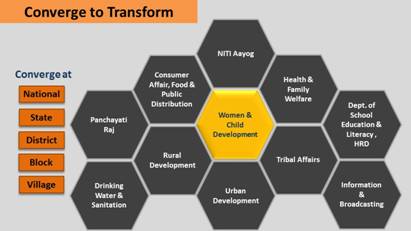POSHAN Abhiyaan to address Malnutrition through Convergence, Use of Technology and a Targeted approach
Components of the Mission and Convergence Action Plan details released in the first National workshop on POSHAN ABHIYAAN
Swasth Bharat Preraks to be the game changers for fast track implementation of POSHAN Abhiyaan
The Ministry of Women and Child Development conducted first National workshop on POSHAN Abhiyaan involving all the States and Union Territories at Pravasi Bharatiya Kendra, New Delhi today. The Ministry organised the day long workshop with participation from all the states/UTs to provide a complete orientation on the POSHAN Abhiyaan,to explain the key components of the Abhiyaan, to provide handholding in using the softwares involved, and to augment the convergence with the different Ministries involved in implementing the Abhiyaan for improved Nutritional outcomes.
Launching the five e-ILA (e-Incremental Learning Approach) courses and two ECCE(Early Childhood Care and Education) software modules, Sh.Rakesh Srivastava,Secretary,WCD has said that the Government has approved a 3-year budget of ₹ 9046.15 cr, commencing from 2017-18, for POSHAN Abhiyaan. e-ILA is an online system where programme functionaries will become more effective by learning to plan and execute each task correctly and consistently through methodical and ongoing capacity building. The purpose of the ECCE module is to guide trainers to train Anganwadi Workers so that they are able to plan and conduct appropriate ECE activities.
By synergising frontline functionaries and volunteers like, DAY-NRLM Self help groups,ANMs,Co-operatives, Swasth Bharat Preraks etc., the Ministry is planning to reach 11 crore people and thereby convert the mission into Jan Andolan. Under the Abhiyaan, Swasth Bharat Preraks will be deployed one in each district for coordinating with district officials and enabling fast and efficient execution of the Abhiyaan across the country. Swasth Bharat Preraks would function as catalyst for fast tracking the implementation of the Abhiyaan. By June 2018, 315 Swasth Bharat Preraks are likely to be deployed in 315 districts of Phase I of the POSHAN Abhiyaan.
Revealing the implementation details on POSHAN Abhiyaan, Dr.Rajesh Kumar, Jt.Secretary,Ministry of Women and Child Development has said that the following components will form the pillars of the Mission :
- ICDS-CAS(Common Application Software)
- Convergence
- Behavioural change, IEC Advocacy
- Training and Capacity building
- Innovations
- Incentives
- Grievance Redressal
Detailing on the implementation, Dr.Rajesh Kumar, Jt.Secretary has enumerated the following key Nutrition strategies and interventions :
- IYCF(Infant and Young child feeding)
- Food and Nutrition
- Immunization
- Institutional Delivery
- WASH(Water,Sanitation and Hygiene)
- De-worming
- ORS-Zinc
- Food Fortification
- Dietary Diversification
- Adolescent Nutrition
- Maternal Health and Nutrition
- ECD(Early childhood development)/ECCE(Early Childhood care and Education)
- Convergence
- ICT-RTM(Information and Communication. Technology enabled Real Time Monitoring)
- Capacity Building
Convergence between different Ministries will be a crucial aspect in making the mission successful. The convergence hexagon can be depicted as :

Principal Secretaries/Secretaries/their representatives from various States/UTs attended the workshop which was held in six different sessions and had speakers from Convergent Ministries and institutions like NITI Aayog, UNICEF and NGOs.
POSHAN Abhiyaan was launched on 8th March 2018 by the Prime Minister in Jhunjhunu. The Abhiyaan targets to reduce stunting, under-nutrition, anemia (among young children, women and adolescent girls) and reduce low birth weight by 2%, 2%, 3% and 2% per annum respectively.The target of the mission is to bring down stunting among children in the age group 0-6 years from 38.4% to 25% by 2022.
AKR/NG/SKK